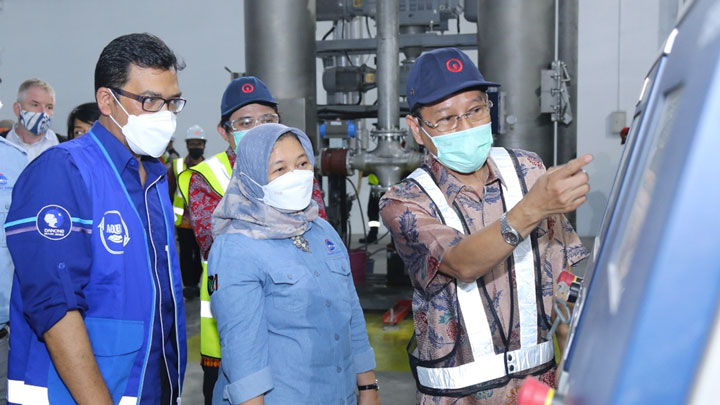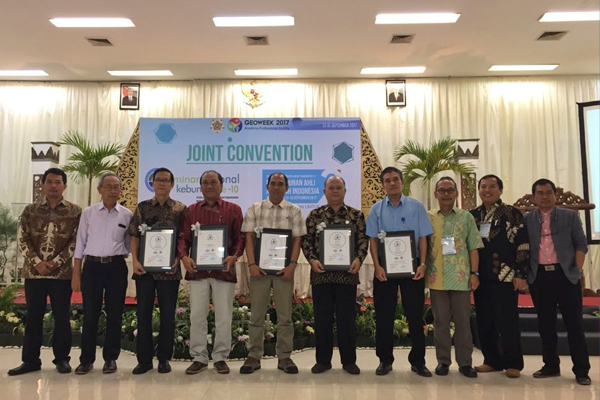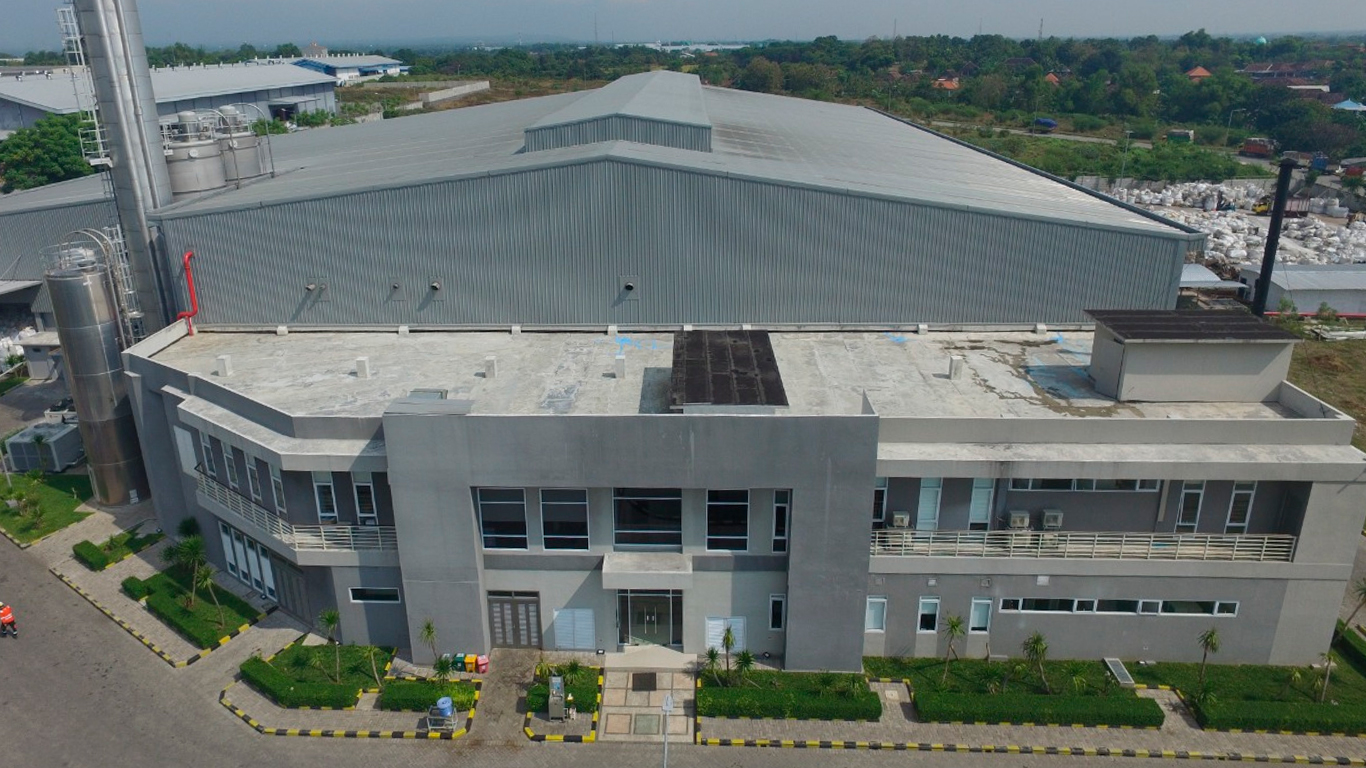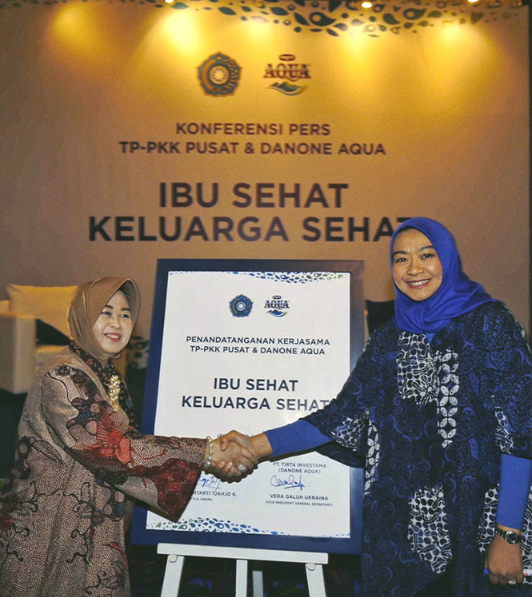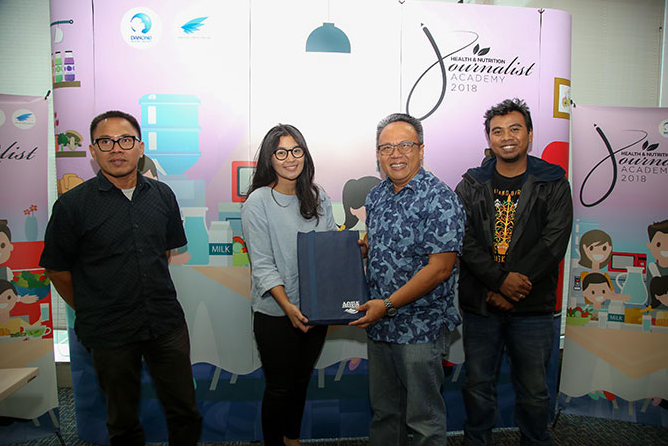Pasuruan, December 8, 2021 – As part of the commitment to strengthen the plastic waste management and reduction system in Indonesia, key members and bodies conducted a review of the largest and most cutting edge polyethylene terephthalate (PET) plastic bottle recycling plant in Indonesia. Coordinating Ministry for Maritime Affairs and Investment (Kemenkomarves) Deputy for Environmental and Forestry Management Coordination Nani Hendiarti, Ministry of Industry Director General of Metal, Machinery, Transportation Equipment and Electronics Industry Taufik Bawazier, the Bali Provincial Development Planning Board (Bappeda), and a number of related department heads analyzed the operation and facility. The plant is owned by PT Veolia Services Indonesia (Veolia Indonesia) and supported by PT Tirta Investama (Danone-AQUA).
The recycling factory was inaugurated by Indonesian Industry Minister Agus Gumiwang Kartasasmita last June. Built on 22,000 square meters of land, construction of the 7,000 square meters facility began in March 2019 and is located in the Pasuruan Industrial Estate Rembang (PIER), in the Rembang District, Pasuruan Regency – East Java Province. It currently has a production capacity of 25,000 tons/year of recycled PET (rPET), which meets food safety standards (food grade) and is halal certified. This facility also employs more than 200 local workers. Streamlined machination enables rapid separation of lids and labels at once, resulting in efficient processing.
Coordinating Ministry for Maritime Affairs and Investment Deputy for Coordination of Environmental and Forestry Management Nani Hendiarti said during her visit that the presence of a plastic recycling factory such as Veolia is paramount in the conversion of end-to-cycle plastic waste. This process will reduce virgin plastic production, while increasing recycled plastic applications. Currently, the plastic recycling ratio in Indonesia is merely 10 percent. "In line with the implementation of the 30 percent waste reduction roadmap for plastic producers, manufacturers and retailers, as well as food and beverage producers, are responsible for reducing waste from their products and packaging through recall, recycling, and/or reuse," said Nani.
“I hope this form of cooperation on a broad scale can be adopted by all producers who use plastic in their products and packaging, either through the construction of shared facilities or through the development of cooperation for the recall of plastic product/packaging waste for recycling. I believe we can solve 39 percent of plastic waste problems which have not been handled through collaboration between stakeholders, including the government, the business world, and the informal sector – such as waste banks. We can learn from the success stories of Veolia Indonesia and Danone-AQUA; how collaborations are established, business designs are built, including transportation, recycling, as well as production and distribution schemes for recycled plastic products,” Nani added.
Host as well as PT Veolia Services Indonesia Director and Veolia Country Director Joko Sunaryo emphasized that by operating a recycling facility equipped with the latest technology, Veolia is expected to be a part of the Indonesian government’s efforts to tackle and reduce the problem of plastic waste in Indonesia. “Therefore, this brings great pride for Veolia Indonesia to be entrusted in cooperation with the Indonesian government and our partner, Danone-AQUA. We earnestly operate the largest and most innovative recycling plant in Indonesia, in order to meet the needs of raw materials from recycled plastic for our partner’s products. The operation of this plastic recycling plant is the contribution of Veolia Indonesia, and our partner Danone-AQUA, in support of the government's goal to reduce 70 percent of plastic waste by 2025 for a cleaner Indonesia, and a cleaner ocean," said Joko.
Meanwhile, Danone Indonesia Sustainable Development Director Karyanto Wibowo said, “The operation of Veolia Indonesia’s recycling factory is a partnership for solving the plastic waste challenge in Indonesia, as well as a driving force for national economic growth. This includes the improvement of welfare for workers in the waste sector, the majority of whom are informal workers.”
“As a circular economy pioneer, Danone-AQUA is committed to continual support of the Indonesian government. For example, through the #BijakBerplastic movement, which includes collection efforts of plastic waste and the acceleration of packaging innovations,” he added.
Veolia Indonesia is a local company that is part of the Veolia Group based in France. It has lengthy experience and particular expertise in plastic recycling and processing. Veolia Group’s vision is that of a company that reaches a benchmark for ecological transformation. Danone-AQUA supports the operations of the Veolia Indonesia factory, as a main consumer, all while ensuring the establishment of an inclusive supply chain of used PET plastic bottles. These operations facilitate their efforts to improve the welfare of scavengers and Waste Management Site for Reduce, Reuse, and Recycle (TPS3R) workers in four Indonesian regencies, under the guidance of the Inclusive Recycling Indonesia project.
Currently, all Danone-AQUA plastic bottles contain up to 25 percent recycled materials. In 2019, Danone-AQUA launched the first drinking water bottle, AQUA Life, in Indonesia made of 100 percent recycled PET plastic. Therefore, the partnership with Veolia Indonesia does not only help increase efforts to collect and recycle plastic waste in Indonesia, but also ensures the use of more environmentally friendly plastic bottles through adequate supply of raw materials.



